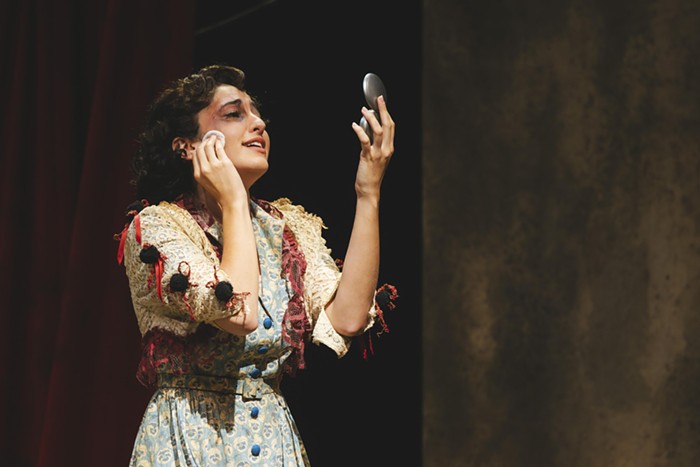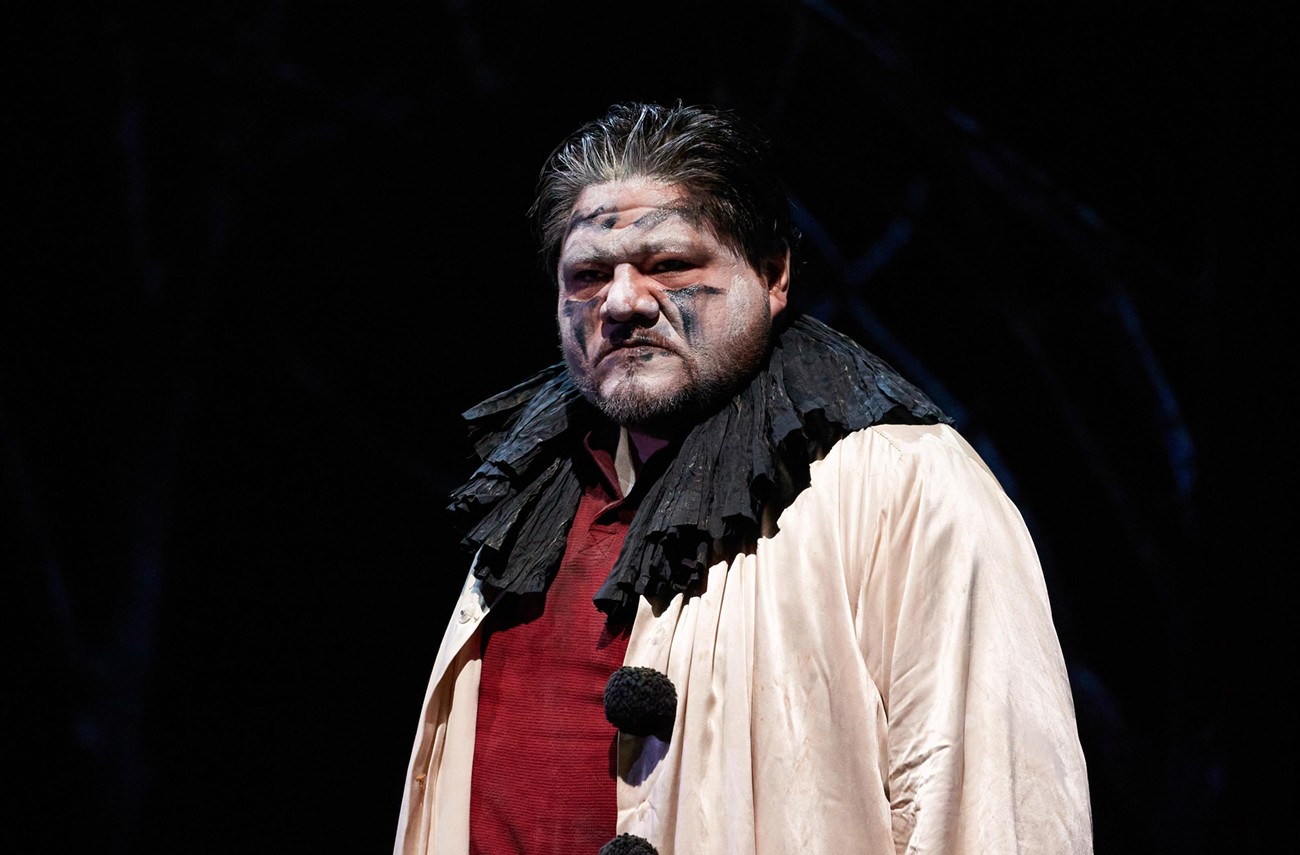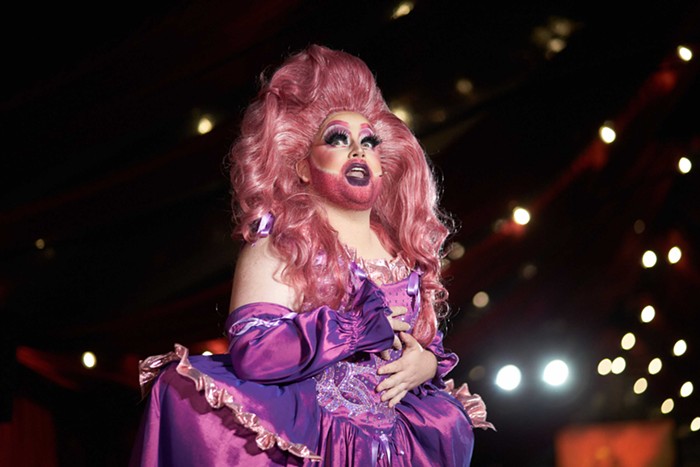Ask the average Seattleite what they think of when they hear the word pagliacci and they’re almost guaranteed to answer “pizza”—or, maybe, “class action lawsuit.” One hundred years ago, though, the average denizen would have almost invariably responded with the word “opera.” And, come August 3, so can you.
As this year’s season opener, Seattle Opera will stage Pagliacci, Italian composer Ruggero Leoncavallo’s bread-and-butter œuvre from 1892. Slapstick funny in some parts, frighteningly dramatic and violent in others, and lyrically miraculous throughout, the 90-minute production was once synonymous with “opera” the way a buxom Bugs Bunny in a viking helmet belting an adapted Valkyrie ditty took over the public’s operatic imagination in the mid-20th century.
If you’re an opera neophyte: Pagliacci is about as good a chance to dip your toes into the artform as you’ll ever get. Try everything once, amirite? This opera’s plot is relatively straightforward and moves quickly, the music is divinely pretty, and wow-factor things happen on stage. I pinky prommy you won’t fall asleep, and you’ll be out of there in about the same time it takes to watch Deadpool & Wolverine. Totally nbd if you decide thereafter that you hated it and never return to the Opera; at least you gave it a shot.

Monica Conesa as Nedda (left) and Michael Chioldi as Tonio (right) in 'Pagliacci' at Seattle Opera. Philip Newton.
As far as “greatest hits” that have historically defined an entire genre go, though, there’s still plenty to criticize. In particular, most versions of Pagliacci typically use violence against women as a platform for entertainment, and, crucially, often elicit flattening sympathy for the perpetrator of that violence. But this quandary-ridden classic is a stunning production at McCaw Hall thanks to Seattle Opera’s self-reflection and attendant adaptation. This act of creatively rebirthing Pagliacci for the 21st century—doing so without heavy-handed revisionism or glossing over a plot’s thorny patriarchal essence—is what makes this opera even more worthy of your attendance and sincere contemplation.
***
Pagliacci means “clowns” in Italian and obliquely refers to how the opera is structured as a play-within-the-play. Canio, a destitute and peripatetic performer, his colleagues Tonio and Beppe, and his wife, Nedda, have traveled to an Italian village and are putting on a play in the commedia dell’arte style.
Canio, who plays a clown (Pagliaccio) when performing for villagers, is a threateningly jealous and possessive husband offstage. Nedda assumes the role of Pagliaccio’s wife Colombina onstage, but in real life grew up on the streets and found herself wedded to and begrudgingly dependent upon Canio; hoping to escape a life of abuse and servitude, she and her secret lover, Silvio, have schemed to run away and elope after the troupe’s performance. But Canio’s henchman-of-sorts Tonio, after making spurned advances of his own toward Nedda, lets Canio know of Nedda and Silvio’s plans to run away, eventually leading to a double homicide and the simultaneous ending of the troupe’s performance as well as the opera itself.
Most stagings of Pagliacci depict Canio as a heartbroken clown driven to do horrible, murderous things because of his cheating wife, who is his everything. You may have seen iconic images or video recordings of opera superstar Luciano Pavarotti crying as he dons his clown makeup when playing Canio as one such example of this sympathetic slant (listen to the rapturous and positive applause at the end of his aria!).
With those shortcomings in mind, Director Dan Wallace Miller’s version of the opera situates Canio, Nedda, and the other performers in Italy in 1947. Artistically inspired by Italian neo-realist films, especially those of Vittorio de Sica, Miller’s setting for Pagliacci is an attempt to place as much weight on characters’ interiority as on their desperate socioeconomic conditions. Miller said these efforts frame “the awful thing that happens at the end… in an even more tragic light” by highlighting the circumstances and decisions that push Canio to murder; the director took other adaptational liberties to cast Canio as a more clearly antagonistic figure. In his version, Canio is more plainly an alcoholic, and Nedda has a black eye from Canio’s physical abuse.
“I don't have an interest in prettying up or denying the abuse that happens in a narrative like this, I think it needs to be expressed. But I do have a vested interest in examining where sympathies need to lie, and showing that the expectations of who you need to suture yourself to and align yourself to in this narrative are way different now than they were 100 years ago,” Miller said. “That, I hope, is reflected and comes through quite strongly and in a way that… if audiences come to see it now, they'll just think this is exactly how the piece was always done.”
Miller, who grew up frequenting Seattle Opera with his dad, said he realized that operatic adaptations going “against the grain of expectation” have to be executed convincingly. “As someone who is young and who has a lot of different forms of entertainment vying for my attention at all times, I try and make something… that I would want to go see,” he said.

Monica Conesa as Nedda in 'Pagliacci' at Seattle Opera. Sunny Martini
Soprano Monica Conesa will make her US debut as Nedda. In her early teens growing up in Florida, she “fell in love” with Nedda’s performance in the final act of Pagliacci, where Nedda shuttles between her real self and her onstage, coquettish persona, Colombina, in an attempt to prevent her bloodthirsty husband Canio from breaking character and ruining the show they’re putting on.
“Finding the sweet spot of doing the transition of where she finally comes out, and she's not only Nedda, but a Nedda who’s had enough and stands her ground… it's just my favorite thing to do,” Conesa said. “I used to play the act on a speaker and pretend to act it out in my room, so in a way, I’ve been rehearsing this since I was 15.”
Simply put, Conesa is spellbinding and her voice possesses cavernous potential; its distinct timbre filled every nook of the rehearsal room I was lucky enough to share with her and the rest of the cast two weeks before showtime. She seems splendidly suited to augment Miller’s creative bent as a thought partner and agent. Conesa cited Betty Boop as her inspiration for Colombina’s mannerisms, which explains her impressive, spry athleticism on stage while full-chest singing; she, like Miller, subtly uses film to render this opera more salient and poignant for viewers.
Conesa, who performed in Italy for two years as the launching pad for her up-and-coming career, is joined onstage by tenor Diego Torre, a resident singer in the Sydney Opera House who grew up in Mexico City. A veteran who’s graced the stage for 15 years, Torre said he’s grown to approach high-stakes roles like Canio’s with maturity and nuance, and has learned how to separate his own self from the characters he plays. “You are playing with their emotions, really, on your skin,” he said.
Torre departed slightly from Miller’s view on Canio. He said he sees Canio as a victim of his situation, and strives to evoke some sympathy from viewers through his performance. (“For someone to act villainous on stage and have an understanding that what they're doing is justified makes the performance much, much better,” Miller told me.)
Whether those adaptational disagreements make the art more persuasive or more diffuse, Torre will make you feel something, for sure. Compellingly afflicted by the complex emotions of a possessive, morose clown, Torre’s Canio will stay with you. He’s very, very talented.

John Marzano as Beppe in "Pagliacci" at Seattle Opera. Sunny Martini
Another lovely performance is seen in local tenor John Marzano, who assumes the role of Beppe. Marzano did a delightful recital in drag at Seattle Opera a few weeks ago; show up for a queer icon, or else you’re homophobic.
Gays on stage or not (there’s almost always at least one), how Miller’s thoughtful adaptation deploys formidable operatic talent for thought-provoking ends is ultimately what sets this version of Pagliacci apart from the countless productions preceding it.
“Opera is weird: We’re the only artform that routinely engages with centuries-old pieces of art,” Miller said. “I view it as my job to take the kernel of that story and twist the prism a little bit until it starts to make sense and have some kind of meaning and purpose today.”
See Seattle Opera’s Pagliacci at McCaw Hall Aug 3–17.















